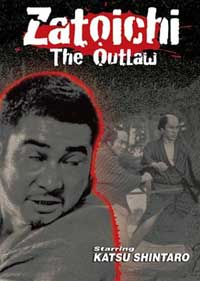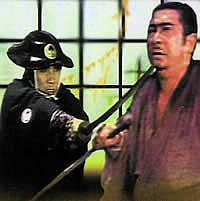 Zatoichi ro-yaburi (Daiei, 1967) is variously known as Zatoichi, the Outlaw, The Blind Swordman's Rescue or Zatoichi Breaks Jail. Zatoichi ro-yaburi (Daiei, 1967) is variously known as Zatoichi, the Outlaw, The Blind Swordman's Rescue or Zatoichi Breaks Jail.
The extraordinary cinematography of Kazuo Miyagawa & a far better than average screenplay, together wit hte steady directorial hand of Satsuo Yamamoto (1910-1983), make this one of the better Zatoichi episodes. It has a larger social commentary than is usual, reminiscent of "tendency films" which had leftist qualities if not messages.
Indeed Yamamoto was an activist in far-left politics, & in the immediate post-war years made a name for himself with politically sensitive films like the suspense thriller The Street Without Sun (Taiyo no nai mach,1954) set in a gloomy ghetto of 1920s Tokyo, where laborers lived harsh lives.
He made War & Peace (Senso to heiwa, 1947) harshly critical of militarism. For this he was soon in trouble at Toho Studios, & fired in their "red purge" of 1948.
But Yamamoto continued to make some of the most significant anti-war films of the era, such as Vaccum Zone (Shinku chitai, 1952) about a soldier with a conscious incapable of adjusting to militarism.
For chambara fans he will always be lionized for his contribution to the long-running Zatoichi series, & even more so for establishing the doomful, cynical tone of the classic Shinobi no mono series starring Raizo Ichikawa, proving in the first two films (1962 & 1963) that action films could be artistic with social awareness without losing the pure thrill.
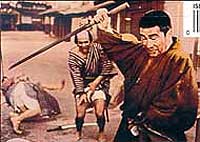 Along the road, Ichi our wandering blind zato or low-ranking masseur wants to buy a slightly fancy patterned towel to bring with him as a gift to someone he'll be visiting. Along the road, Ichi our wandering blind zato or low-ranking masseur wants to buy a slightly fancy patterned towel to bring with him as a gift to someone he'll be visiting.
When the old woman at the roadside station takes money for the nicer towelette but tries to fob off a plain towel, Ichi gives his purchase a sniff & knows at once he's been cheated.
That of course is the least of this blind masseur's amazing abilities. While at a dicing game, his canesword flashes forth so swiftly that at first no one knows he has just cut a pair of cheating dice in halves.
Ichi simply cannot abide cheating, & in a sour mood confesses, "I can't stand those things that do make the world a better place" as he flicks a toothpick through a moth.
Startled yakuza know he means them, for Ichi's iai rapid draw cuts down men as easily as his toothpick pinned that flopping, fading moth.
But Ichi also has his poetic side, & during this episode we'll see him playing shamisen beautifully -- a skill star Shintar Katsu learned from his father, a famous shamisen player of the kabuki stage.
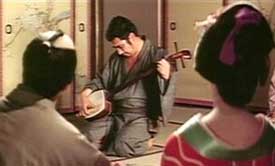 Following fifteen earlier episodes it would be understandable if these films were running out of steam. But Zatoichi, the Outlaw, the sixteenth episode, is a strong entry. Following fifteen earlier episodes it would be understandable if these films were running out of steam. But Zatoichi, the Outlaw, the sixteenth episode, is a strong entry.
Though much of it is by now ritualistic in its familiarity, there are good twists to the formula, & as always great acting, gorgeous choreography, brutal violence, & heartbreakingly beautiful cinematography.
And of course there's the stunningly charismatic presence of Shintaro Katsu as Ichi-san. This episode is also a tiny bit gorier than most of the earlier one, though nowhere near as gory as many another series, such as the crimson-spewing Lone Wolf with Child films.
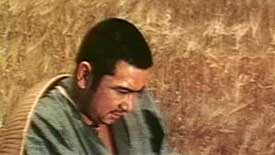 Zatoichi comes to a village troubled, like most of the villages he visits, by a decidedly unvirtuous yakuza gang headed by boss Tomizo, supported by corrupt officials. Zatoichi comes to a village troubled, like most of the villages he visits, by a decidedly unvirtuous yakuza gang headed by boss Tomizo, supported by corrupt officials.
The peasants also have an advocate, a swordless samurai, Ohara Shusui, whom the peasants address as Ohara-sensei, their teacher.
He instructs them in abstinance from drinking & gambling. He also teaches improved & practical farming techniques which we're left to guess he learned from contact with western agriculturalists, as otherwise it's rather odd a samurai knows more about good farming techniques than do the farmers.
Ohara is of course a thorn in the side of the yakuza gang who gain power over the locals by seducing them into gambling debts.
It can be overlooked by any viewer who doesn't want "lessons," but there's a striking political underpinning to the relationship between Ohara & Ichi, which required Ichi to be a pretty poor judge of character. Ohara has given up his two sowrds to be a farmer because he believes the future of Japan is not with the overbearing samurai. But Ichi distinctly disagrees with his attitude.
Although Ichi has seen corruption in government in countless episodes, he still wants to beleive in the system. In episode after episode he establishes that one violent, risk-taking, practically invulnerable individual -- namely, himself -- can eradicate corruption in the isolated places where it raises its ugly head. "Isolated" cases being the key, Ichi really believes the larger context of feudalism is not in itself harmful. The arch-conservative, Ichi does not like the idea of change.
The farmer-samurai on the other hand dreams of extravagant change from top to bottom, & has given up on the belief that a mighty sword is what change requires. Nothing will make him take up his swords anew, not even martyrdom. From Ichi's point of view -- an inveterate muddler & true believer in just killing bad guys in great numbers -- regards Shusui a stupid man. It takes Ichi a long time to change his mind about this.
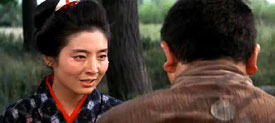 In contrast to Ohara Shusui's utopianism, Ichi has a greater fondness for a certain boss of the village, a fonkdness that requires him again to be a poor judge of character. In contrast to Ohara Shusui's utopianism, Ichi has a greater fondness for a certain boss of the village, a fonkdness that requires him again to be a poor judge of character.
This oyabun of the smaller yakuza group is Asagoro (Rentaro Mikuni), whom Zatoichi admires, & sees as evidenced that chivalry is still alive, that a feudal system means help for the needy.
Asagoro is trying not to have a war with the larger gang, & has paid some of the farmers' debts to the more unruly gang. Plus he never permits poor farmers to lose too much when they are in his gambling den. He seems indeed a wonderful yakuza boss.
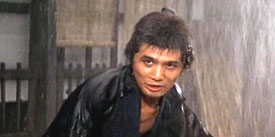 [SPOILERS ALERT!] Ichi naturally feels that if boss Asagoro were in control of the gambling territory, life would go better for the peasants who could have a little fun now & then without finding themselves ruined by the greed of gangsters. [SPOILERS ALERT!] Ichi naturally feels that if boss Asagoro were in control of the gambling territory, life would go better for the peasants who could have a little fun now & then without finding themselves ruined by the greed of gangsters.
So when the encounter between the rival gangs becomes inevitable, Ichi voluntarily intercedes, & ends up singlehandedly wiping out the evil gang with his rapid-reverse-draw blind man's sword style.
He then has to head off on the road as an outlaw, but is confident life will be better for the peasants who won't be dominated by the cruel gang any more.
What he never realized is that Asagoro is two-faced or chameleonic. After he becomes powerful in the territory, he completely sells out to corrupt government officials & does more harm to the common people than they had experienced before!
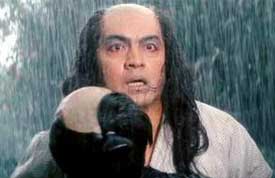 In all Zatoichi features, the assumption is that violence done well can put wrongs to right. But now & then the stories also confess there are repurcussions. In all Zatoichi features, the assumption is that violence done well can put wrongs to right. But now & then the stories also confess there are repurcussions.
Not only were the repurcussions of his upraising Asagoro rather severe, but Ichi's actions also gained him a tragic enemy of Oshino (Yuko Hamada). She is a woman reduced to prostitution after Ichi cut off her boyfriend's arm & killed her only brother. Ichi's swift sword can be less than a heroic thing when like a God he decidese who no longer deserves life.
Nisaburo (Toshiyuki Hosokawa), the one-armed survivor of Ichi's sword, encounters him at random & tries to kill him. When Ichi realizes who the young one-armed man must be, he avoids killing him, & finds out about Asagoro. Ichi has learned about Oshino's situation & would like to help Nisa redeem her, but as these lives go from sad to sadder, Oshino commits suicide.
Ichi is easily guilt-tripped but never really changes his ways. Since it was his violence that caused all this tragedy, he has no choice but to return to that village & do more violence to set things right. Because when an action doesn't work, the same action must be repeated.
When he meets Asagoro again, he discovers the once-promising gang boss is truly hypocritical, making every conceivable excuse for himself while trying to escape from Ichi. But Asagoro has bronchitis or perhaps tuberculosis & Ichi pursues his cough while Asagoro's minions try to protect him & kill Ichi. Eventually Asagoro's head will roll.
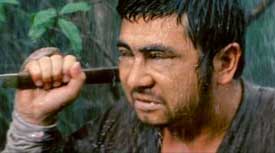 Elsewhere in the village corrupt officials who want to be rid of the swordless samurai have had him arrested. Elsewhere in the village corrupt officials who want to be rid of the swordless samurai have had him arrested.
The peasants find badly injured Ichi, place him on a broken door, & carry him to the road & dump him in front of the group of samurai who are transporting Ohara to Edo tied up in a basket.
Being personally wounded is not nearly enough to stem Zatoichi's fury, & he carves down samurai as easily as he carved down the yakuza. He cuts open the basket so that Ohara can step out. This basket, by the way, is the "jail" Ichi breaks someone out of in the inferior alternate title Zatoichi Breaks Jail.
Whether any of this really puts things to right in the long run is left uncertain. Ohara is certainly dissatisfied, & sadly tells Ichi, "We couldn't prevent the good earth from devouring blood."
With this mild chastisement in mind, Ichi walks off down the road, "the sun at his back" as the folksong had said. [END SPOILER ALERT]
We as viewers of this politically rich & violent drama are never really instructed as to which perspective is best -- the pacifistic martyr approach, or the "put up with all you can stand & when it gets to be too much, kill everyone" like Ichi does. Because this is a chambara film, we of course expect Ichi's way to provide the climax; but even Ichi begins to wonder if his way is correct.
He saved the pacifistic samurai for fear the man's philosophy would die if he died. But Ichi, forever the emotional martyr hard on himself, now has a new way of thinking about why he personally is an unworthy beast.
And in another curious turn for the series, when the villagers carry the injured Ichi on a board to the place where he will kill everyone who caused anyone trouble, he is afterward rewarded for the thing he now understands is wrong. He's rewarded by reverence from the villagers, though in so many episodes he leaves town more than ever the outcaste, rejected even by the terrified people who aided, but who do not want such a monster among them after evil is destroyed.
The usual cliche of the series is there is only one woman in love with Ichi, the only one sorry that he leaves. But this time the whole village loves him & wishes he would not leave. For once he could have settled down as an honored citizen, but rejects himself instead of being rejected by others.
copyright © by Paghat the Ratgirl
|
